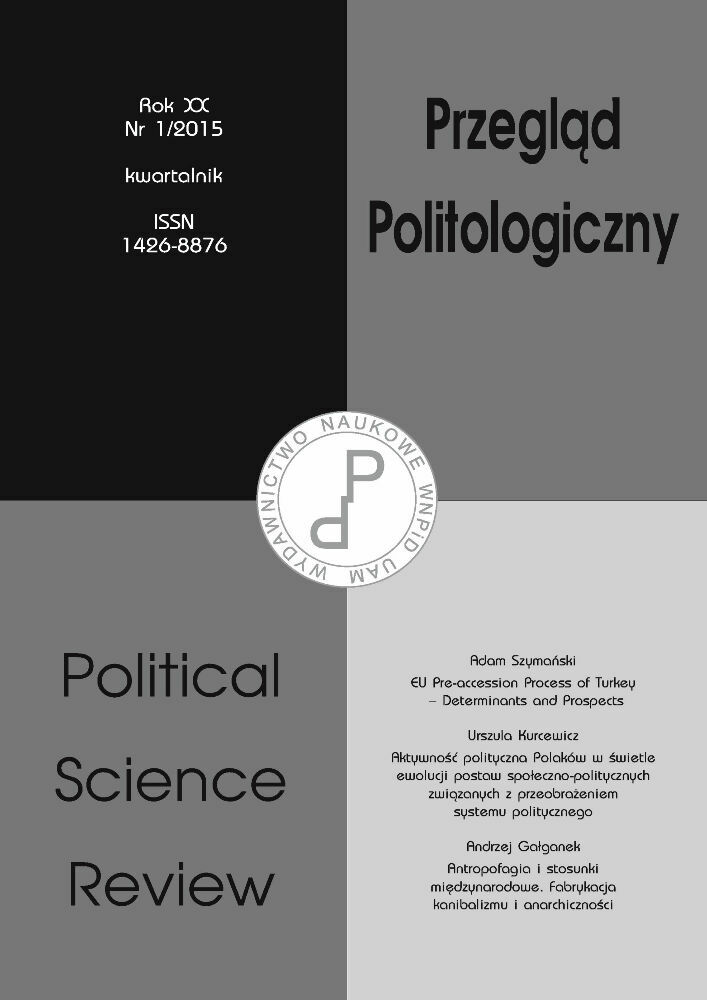Abstrakt
This article concerns the current pre-accession process of Turkey and the question of its prospects. In order to answer this question the author conducts an in-depth analysis of factors that can influence the process on three main levels: EU (i.e. general political and economic situation, EU enlargement policy, EU institutions), member states and Turkey. He wants to verify the hypothesis that although the situation in this candidate country is crucial for the future of Turkey-EU relations, the decisive factors are in the EU and member states. The pre-accession process of Turkey will be continued but its pace and course will depend to a large extent on the position of the main Union’s powers, the clear vision of the EU as well as the economic/political situation and public feelings in Europe.
Bibliografia
Deutschlands Zukunft gestalten. Koalitionsvertrag zwischen CDU, CSU und SPD. 18. Legislaturperiode (2013), https://www.cdu.de/sites/default/files/media/dokumente/koalitions-vertrag.pdf, 10.12.2013.
European Commission (2006), Communication from the Commission to the European Parliament and the Council. Enlargement Strategy and Main Challenges 2006–2007 including annexed special report on the EU’s capacity to integrate new members, Brussels, November 11, 2006, COM (2006) 649 final, http://ec.europa.eu/enlargement/pdf/key_documents/2006/Nov/com_649_strategy_paper_en.pdf, 10.10.2012.
European Commission (2013), Cecilia Malmström signs the Readmission Agreement and launches the Visa Liberalisation Dialogue with Turkey , IP/13/1259, Brussels, 16 December 2013, http://europa.eu/rapid/press-release_IP-13-1259_en.htm, 10.06.2014.
European Commission (2014), Statement from the European Union on the agreement reached by the Greek Cypriot and Turkish Cypriot leaders on a joint declaration and on the resumption of the negotiations, MEMO/14/103, Brussels, 11 February 2014, http://europa.eu/rapid/press-release_MEMO-14-103_en.htm, 10.06.2014.
European Parliament (2012), European Parliament Resolution of 29 March 2012 on the 2011 Progress Report on Turkey , Brussels, March 29, 2012, www.europarl.europa.eu, 27.10.2012.
European Parliament (2014), Results of the 2014 European elections, http://www.results-elections2014.eu/en/election-results-2014.html, 12.06.2014.
Fox B. (2013), Economic recovery slow and painful, EU’s Rehn says, “EU Observer”, 5.11.2013, from http://euobserver.com/news/121990, 6.11.2013.
German Marshall Fund (2013), Transatlantic Trends, Topline Data 2013, http://trends.gmfus.org/files/2013/09/TT-TOPLINE-DATA.pdf, 10.06.2014.
Hillion Ch. (2010), The Creeping Nationalisation of the EU Enlargement Policy, “SIEPS Report”, no. 6, http://www.sieps.se/sites/default/files/2010_6_.pdf, 13.10.2012.
Ìçener E., Phinnemore D., Papadimitriou D. (2010), Continuity and Change in the European Union’s Approach to Enlargement: Central and Eastern Europe and Turkey Compared , “Southeast European and Black Sea Studies”, vol. 10, no. 2, pp. 207–223.
Ìdiz S. (2012), No Time to Burn Bridges , “Hurriyet Daily News”, 2.11.2012.
Karapınar T. (2014), Youtube yasağǐ kalki, “Milliyet”, 9.04.2014, www.milliyet.com.tr/youtube-erisimeacildi/gundem/detay/1864631/default.htm, 16.06.2014.
Kongar E., Kücükkaya A. (2013), Gezi direnişi, Cumhuriyet Kitapları Ìstanbul.
Phinnemore D. (2009), From Negotiations to Accession: Lessons from the 2007 Enlargement, “Perspectives on European Politics and Society”, vol. 10, no. 2, pp. 240–252.
Pierini M. (2012), President François Holland on the Foreign Policy Front, “Turkish Policy Quarterly”, vol. 11, no. 1.
Rettman A. (2013), Turkey and EU Restart Membership Talks, “EU Observer”, 5.11.2013, http://euobserver.com/foreign/122001, 6.11.2013.
Sencar Ö. (2013), Liderlerin Ìtibarǐ ve Kurumlara Güven, MetroPOLL, http://www.metropoll.com.tr/report/liderlerin-itibari-ve-kurumlara-guven-ocak-2013, 5.06.2013.
Szymański A. (2007), Alternatives to EU Membership. The Case of Turkey, “The Polish Quarterly of International Affairs”, no. 4, pp. 55–72.
Szymański A. (2008), Między islamem a kemalizmem. Problem demokracji w Turcji, PISM, Warsaw.
Szymański A. (2012a), Introduction, in:Turkey and Europe. Challenges and Opportunities, ed. A. Szymański, PISM, Warsaw, pp. 11–19.
Szymański A. (2012b), Rozszerzanie Unii Europejskiej – współczesne uwarunkowania i perspektywy kontynuacji procesu/European Union Enlargement – Contemporary Determinants and Prospects for the Continuation of the Process, ASPRA-JR, Warsaw.
Tocci N. (2007), Report, Unpacking European Discourses: Conditionality, Impact and Prejudice in the EU-Turkey Relations, in: Conditionality, Impact and Prejudice in EU-Turkey Relations, ed. N. Tocci, IAI-TEPAV, Rome, pp. 7–32.
Uður M. (2010), Open-Ended Membership Prospect and Commitment Credibility: Explaining the Deadlock in EU–Turkey Accession Negotiations, “Journal of Common Market Studies”, vol. 48, no. 4, pp. 967–991.
Yavuz H. M. (2009), Secularism and Democracy in Turkey, Cambridge University Press, Cambridge.
